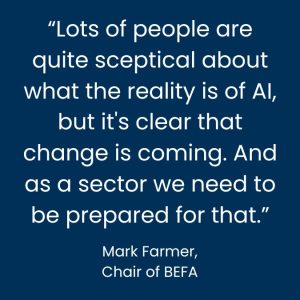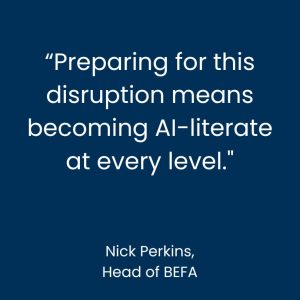Preparing for disruption: how AI is reshaping professional services
Posted on: 22 October, 2025

by Nick Perkins
Head of Built Environment Futures Assembly
Artificial intelligence is no longer on the horizon – it’s already transforming how built environment professionals work.
The University of the Built Environment recently launched the Built Environment Futures Assembly (BEFA), a leadership forum uniting education and industry to strengthen the sector’s capacity, capability and competency for the future. Here, the head of BEFA, Nick Perkins, explores AI as a disruptor and how it can be harnessed responsibly across professional services.
AI’s disruption is here
 Across architecture, engineering, surveying and project management, AI is rapidly moving from theory to practice. AI-powered tools are automating tasks once done entirely by humans.
Across architecture, engineering, surveying and project management, AI is rapidly moving from theory to practice. AI-powered tools are automating tasks once done entirely by humans.
For example, AI is now being applied in:
- Architectural design: Generative design and drafting tools can produce and refine building plans automatically.
- Project planning: AI-driven schedulers analyse project data to optimise timelines and resource allocation.
- Quantity surveying: Automated cost estimation software rapidly performs take-offs and budgeting, boosting efficiency by up to 50%.
- Construction management: Drones and AI vision systems monitor site progress and safety in real time, augmenting managers’ oversight.
These applications promise to break down traditional silos in design and construction whilst bringing a new level of predictive power to complex tasks.
Yet the challenge is not just in what AI can do – it’s in how the sector adapts.
How can the built environment harness the power of automation without losing the human expertise and judgement that clients and communities depend on?
This question sits at the heart of BEFA, which exists to help the sector prepare for technological and societal disruption.
In this short video, BEFA Chair Mark Farmer, author of ‘Modernise or Die’ and ‘Transforming the Construction Workforce’, explores the opportunities and risks of AI in professional practice.
Separating real potential from hype
 AI’s promise is immense, but implementation still lags behind ambition. A July 2025 MIT study found that most AI investments fail to deliver value – not because the technology doesn’t work, but because organisations lack the skills and culture to use it effectively. For the built environment, this highlights an urgent need to upskill the workforce, rethink professional education, and embed digital literacy as a core competency.
AI’s promise is immense, but implementation still lags behind ambition. A July 2025 MIT study found that most AI investments fail to deliver value – not because the technology doesn’t work, but because organisations lack the skills and culture to use it effectively. For the built environment, this highlights an urgent need to upskill the workforce, rethink professional education, and embed digital literacy as a core competency.
AI is not infallible, and its limitations underscore the continuing importance of human oversight. Professionals will increasingly act as sense-checkers and interpreters, ensuring AI outputs make real-world sense and align with ethical standards. In an industry built on trust, accuracy and accountability, that human layer remains vital.
Building AI-ready skills
Preparing for this disruption means becoming AI-literate at every level. Professionals will need to understand how to interpret data, challenge machine outputs and use technology responsibly. To achieve this, universities and training providers must embed digital and AI skills into their curricula, ensuring graduates are fluent in the tools shaping tomorrow’s workplaces.
Employers and professional bodies also have a key role through continuous professional development – from short courses and micro-credentials to peer learning and mentoring. Just as importantly, organisations must foster a growth mindset that sees staying current with technology as part of every professional’s duty.
How BEFA is leading the way
Supporting this transformation is a core mission of the Built Environment Futures Assembly. BEFA brings together leaders from education, government, professional bodies and industry to ensure that policy, practice and learning evolve in step with technological change.
On the education front, BEFA acts as a convener, helping universities and employers align curricula with emerging digital tools such as AI, data science and automation. By sharing insights from its network of partners, BEFA supports course innovation and ensures the supply of skills meets future demand.
For the existing workforce, BEFA promotes upskilling and knowledge exchange, commissioning research, publishing case studies of successful AI adoption and showcasing examples of best practice. In parallel, it contributes to discussions on professionalism and ethics, guiding the development of new competency standards and frameworks that safeguard trust as workflows evolve.
A wave of opportunity
AI’s disruption is inevitable – but with the right preparation, it can become a wave of opportunity rather than a threat.
By investing now in education, professional standards and future skills, the University and BEFA aim to cultivate a workforce that sees AI as a powerful assistant, not a rival.


